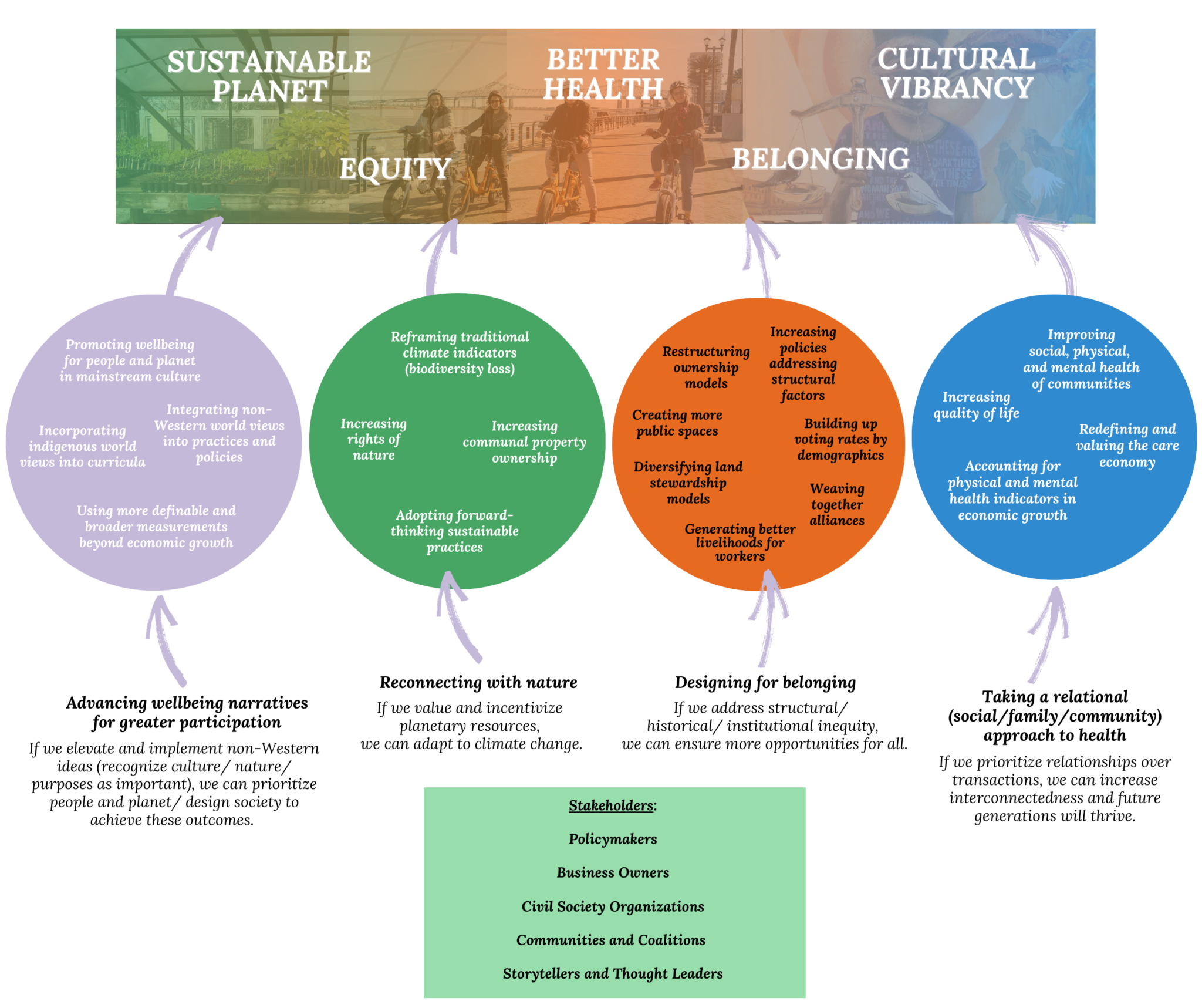Project Context
Wellbeing brings the interdependency of individuals, community and the planet into clearer focus.
Wellbeing is not an outcome but a praxis that moves us towards interconnection. It’s through restructuring how the stakeholders collaborate that we can create and live a different version of progress that honors the interdependence of individuals, societies, and nature.
Through this research project, we aim to surface insights about the ongoing efforts and opportunities that are creating systemic transformation in the areas of public health, environment, economics, and collective narrative in which mandates are centered around building a reimagined society with better health built on equity and belonging on a sustainable planet filled with cultural vibrancy.
This is a living map that will serve as a container for the insights that emerge as we interview the vast network of experts and practitioners within the wellbeing field.

Social Equity
Equity and communal work are central components of shifting to a wellbeing economy. The current economic system, which relies on limited means of redistribution, does not tackle inequities at their source. Property owners, communities and government stakeholders can reshape the economic system in more equitable and sustainable ways that include valuing the care economy and reimagining property ownership via communal forms of land ownership, such as community land trusts; sovereign land; and reclaiming Indigenous land tenures.
Community Rooted
A critical component of social equity is a commitment to wellbeing approaches that are community rooted and mindfully adaptive of cultural differences. This includes measurement approaches to wellbeing such as data gathering, program or initiative planning, participatory research and storytelling distribution or narrative focus. Regarding cultural differences, it is important to incorporate how traditions, ancestries and values shape experience and value systems. Dominant societal narratives can devalue the importance of cultural differences but a focus on wellbeing considers the unique contributions of that diversity from ideation to implementation. It is also critical to connect community-rooted work with historical context in mind and deep consideration for the impact of that history on particular community groups.
Sustainable Planet
A wellbeing economy prioritizes sustainable practices that promote the health and welfare of communities and the environment. Governments that shift away from GDP-centric measures to holistic indicators are likely to adopt better policies that prioritize reduced consumption, improve food distribution flows, encourage sustainable development and regenerative agriculture, and fund climate-adaptive conservation efforts. Wellbeing is based on the recognition that factors, such as life satisfaction, are tied to the economic and social progress of a community, yet are not consistently considered alongside traditional measures of economic progress, such as the GDP. Through grassroots collective action, communities can lead the way, adopting eco-friendly practices, conserving natural resources and collectively contributing to a sustainable planet. Property owners also play a pivotal role in redesigning ownership in a way that encourages housing affordability through community land trusts, co-housing communities and sovereign land, among other strategies.
Better Health
A wellbeing economy prioritizes holistic measures of prosperity beyond mere economic indicators, promoting policies, programs and structures that directly impact health outcomes. Prioritizing wellbeing over economic growth means ensuring equitable access to health care, nutritious food and clean water, caregiving support, work-life balance and community wellbeing initiatives. All these things have been shown to reduce stress and promote overall health. Ensuring economic equity also directly impacts health by addressing social determinants such as income, education and access to resources. Aligning economic goals with wellbeing promotes better health outcomes and a more resilient society.

Collective Wellbeing
Wellbeing is a collective, community-based concept, because human needs are interconnected, and extends to the natural environment and the health of our planet. A wellbeing approach does not focus on a single issue, but on the intersection of that issue with other challenges within a community and thereby solves multiple issues simultaneously. This allows us to draw in many stakeholders representing various issues, interests, perspectives and sectors. Wellbeing brings interdependency into clear focus and addresses how individuals, communities and the planet are impacted by multiple factors that often intersect. These include social, political, cultural, economical, environmental and structural. For wellbeing work to be successful, the circle of people involved must continue to expand and include a dynamic range of stakeholders including decisionmakers and practitioners. Collective wellbeing encompasses geographic diversity and a generational lens, considering the impact of wellbeing work on generations to come.
